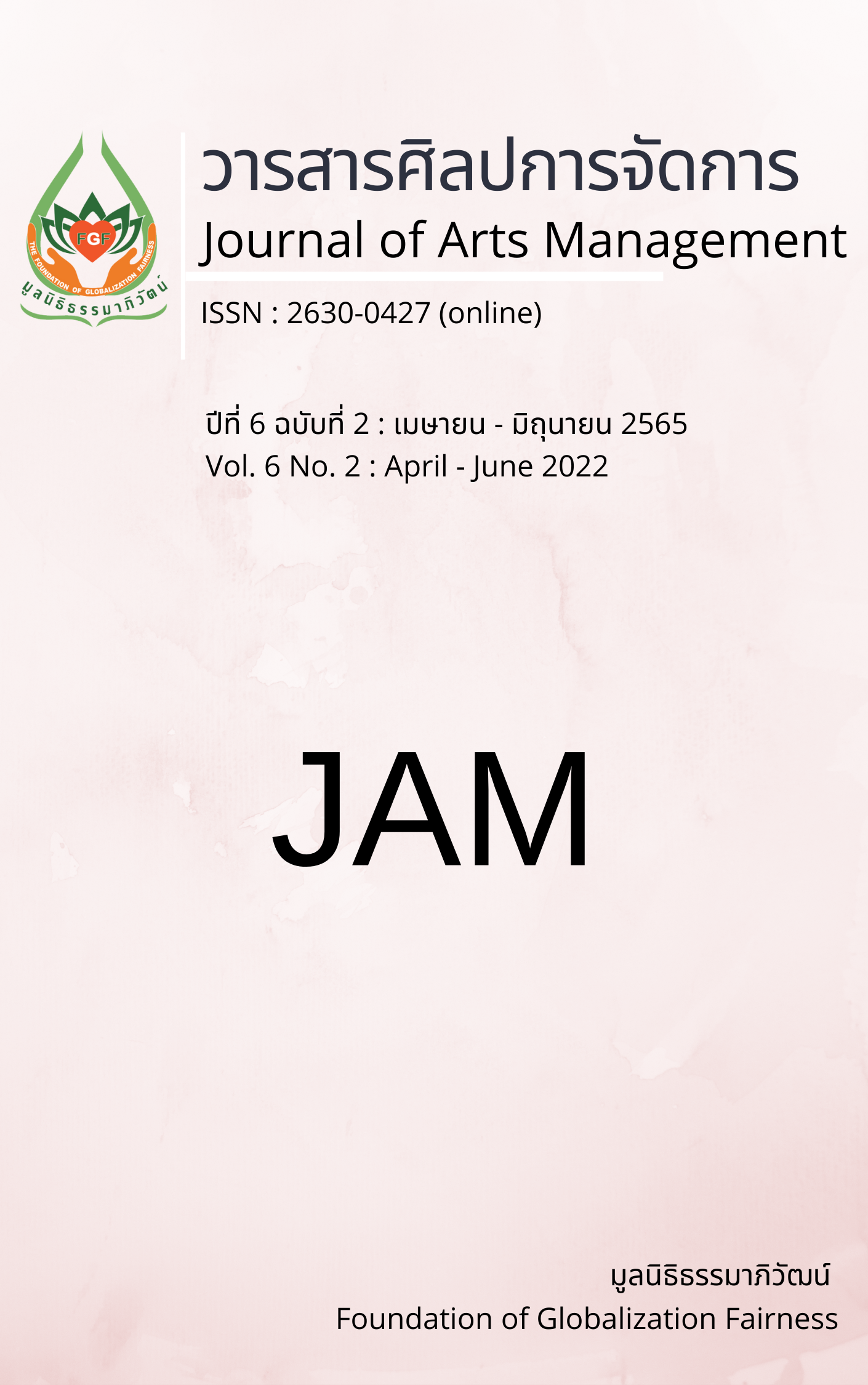Development of the Body of Knowledge, Innovation Area for Learning the Buddhist Way of Life
Main Article Content
Abstract
This article aimed (1) to study conditions of innovative educational pilot areas; (2) to analyze the knowledge of the development of educational innovation areas; and (3) to present guidelines for the development of educational innovation areas. This research was qualitative research. Information collected using interview form and a group discussion for statistical data analysis was used in data analysis, including descriptive statics and content analysis. The results of the research showed that 1) pilot educational innovation areas There is a process to create the practice guidelines, which are set in 6 steps, namely: (1) identification of innovations, (2) creation of innovations and innovation development, (3) finding the efficiency of educational innovations, (4) procedures for implementing innovations, (5) applying them in situations, and (6) evaluating the use of innovations. 2) Knowledge of educational innovation area development found model: 6744-Model with 6 success factors. The participation of network partners has 7 processes. 3) The development of innovation areas in education found that they relied on elements that focused on enhancing achievement and reducing inequality in education. Therefore, innovation areas in Buddhist education include Consequently, there were (1) activities on Buddhist sufficiency, using water efficiently and sustainable agricultural ways, (2) activities on learning Buddhist ways, (3) activities on foot, stepping in merit, and (4) activities to transfer knowledge of the Buddhist way of life. By building a network and cooperating in connecting the body of knowledge and local wisdom.
Article Details

This work is licensed under a Creative Commons Attribution-NonCommercial-NoDerivatives 4.0 International License.
Views and opinions appearing in articles in the Journal of Arts of Management It is the responsibility of the author of the article. and does not constitute the view and responsibility of the editorial team I agree that the article is copyright of the Arts and Management Journal.
References
Chaiso, P. (2013). Development of innovation in teaching and learning for supporting student teachers’ assessment competency for learners’ development. Kasetsart University Research and Development Institute.
Chen, X., & Phakdeephirot, N. (2021). Comparison and analysis of the methods for measuring the sustainability of farmers’ livelihoods. International Journal of Multidisciplinary in Management and Tourism, 5(2), 87–99.
Damnoen, P. S. (2021). The development of student characteristics in according to the Nawaluk framework of the Buddhist integration of Buddhapanya Sri Thawarawadee Buddhist College. Asia Pacific Journal of Religions and Cultures, 5(2), 126-135.
Damnoen, P.S., Phumphongkhochasorn, P., Punwasuponchat, N., & Srichan, P.W. (2021). The development of learning management design models in compulsory subjects of the master of education program in educational administration innovation in order to enhance the characteristics of learners according to the needs of the professional education institution administrators. Turkish Journal of Physiotherapy and Rehabilitation, 32(3), 20459–20466.
Mahachulalongkornrajavidyalaya University. (1996). Thai Tripitaka. MCU Press.
Nua-amnat, R., Brahmakappa, A, Pumturian, S, & Soonthondachar, J. (2021). The Development of Knowledge and Community Components of “Smart Community” for Community in Thai Society. Journal of Arts Management, 5(3), 559–573.
Office of the Rajabhat Institute Council. (2001). Rajabhat University of the people's republic of Thailand. Office of the Rajabhat Institute Council.
Phataraphanpee, T. (2020). The process of promoting occupation indentify for the elderly in Tumbol Bangpla Bangplee District Samutphakarn Province. Humanities and Social Sciences Journal, Ubon Ratchathani Rajabhat University, 11(2), 228–243.
Phra Brahmagunabhorn (P. A. Payutto). (2014). Buddha Dhamma (39th ed.). MCU Press.
Ruangsiri, D., Pauwongsakul, S., & Wonnawed, N. (2021). Administration of information and communication technology in schools under the secondary educational service area office Kanchanaburi and Ratchaburi. Journal of Multidisciplinary in Humanities and Social Sciences, 4(3), 1105–1122.
Songsraboon, R., Thongtao, J., Damnoen, P.S., & Huanjit, P.S. (2021). course management based on outcome-based education (OBE) of learning by working in real conditions. Turkish Journal of Physiotherapy and Rehabilitation, 32(3), 20491–20499.
Tan, C. C., & Damnoen, P. S. (2020). Buddhist Noble Eightfold Path Approach in the Study of Consumer and Organizational Behaviors. Journal of MCU Peace Studies, 8(1), 1–20.
Tan, C.C., Damnoen, P. S., Huanjit, P. S., Toprayoon, Y., Jankaew, W., & Pindon, P. S. (2021). A Socio-Cognitive Structured Stimuli in Validating Students' Organistic States Represented by Self-Efficacy and Psychological Engagement for Career Search Self-Efficacy. Review of International Geographical Education Online, 11(10), 2163-2174.
Techaprasittiwanich, P. (2020). The process of creating knowledge and understanding of using the online registration system in higher education. Journal of Educational Innovation and Research, 3(2), 121–130.
The Secretariat of The House of Representatives. (2019). Education Sandbox. Secretariat of the House of Representatives.
Thongprong, T., Singprasong, K, Theerawit, K., Youngsapanan, P., & Sunthornklam, P. (2020). A Study of problems on using innovation for teaching in the demonstration school of Ramkhamhaeng University (Secondary School). Journal of Arts Management, 4(1), 124–139.
Tiacharoen, S., Phiwithayasiritham, C., Nillapun, M., & Chenaksara, N. (2022). Building the systems, mechanism and networking model for collaborative educational administration of educational service office area in Kanchanaburi province. Journal of Multidisciplinary in Humanities and Social Sciences, 5(1), 1–20.
Tirataradol, Y., & Wongwiwattana, S. (2021). Current competencies and desirable competencies of the educators from the perspectives of Mahidol University’s faculty level executives. Journal of Multidisciplinary in Humanities and Social Sciences, 4(3), 1123–1140.
Udsuay, P.P. (2021). The green school management model according to the 7 Sappaya principle of participatory principles. Journal of Educational Management and Research Innovation, 4(1), 1–9.
Yusamran, P. P., Thitipasitthikorn, P. P., Damnoen, P. S., Thienthong, P. B., Rattana-ngam, S., & Homchan, P. (2021). Conservative and inheritance of Atthami Bucha day for sustainable promotion tourism. Journal of Positive Psychology and Wellbeing, 5(3), 1400–1410.
Zhao, S. (2021). Combined AHP-TOPSIS-IPA and Statistical Analyses for Implications to One Belt One Road Initiatives. International Journal of Multidisciplinary in Management and Tourism, 5(2), 100–121.


